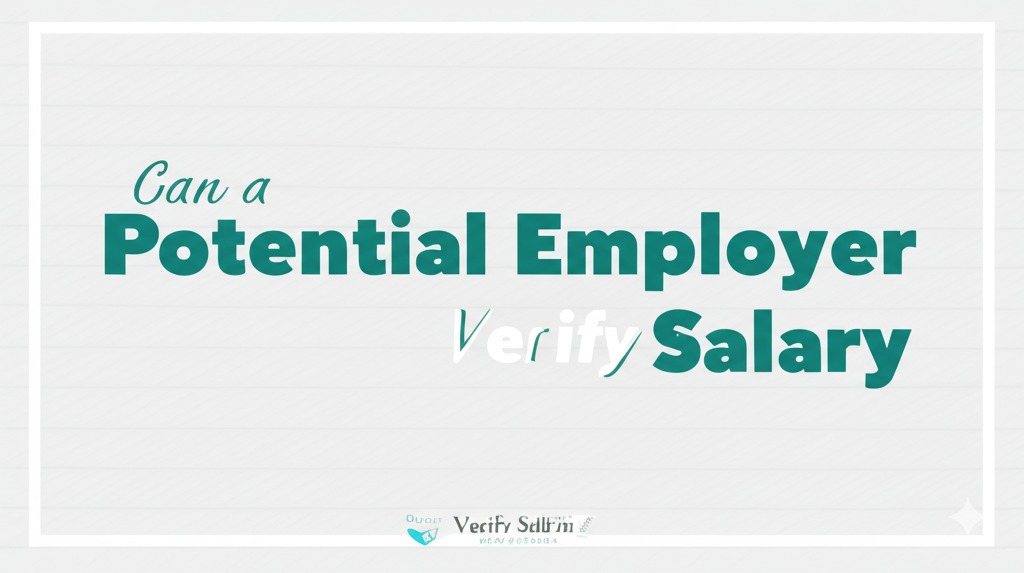
When you’re applying for a new job, your previous salary can feel like sensitive information. Yet, many job seekers find themselves wondering: Can a potential employer verify your past salary? The answer is more nuanced than a simple yes or no. It depends on local laws, employer practices, and what information you provide.
In this article, we’ll break down whether and how employers can verify salary, what rights you have as a job candidate, and how to handle salary discussions during your job search. Whether you’re changing careers, negotiating pay, or simply protecting your privacy, understanding this process can give you a strong advantage.
Why Do Employers Want to Know Your Previous Salary?
Before diving into whether they can verify it, it helps to understand why employers care.
Common Reasons Employers Ask About Past Salary:
- Benchmarking compensation for the new role
- Understanding your career progression
- Assessing whether you’ll be satisfied with their pay offer
- Attempting to negotiate starting salary
While some companies genuinely want context, others may use salary history to anchor salary negotiations—often to the disadvantage of the applicant.
Can a Potential Employer Legally Ask for Your Salary History?
This depends on where you live. In recent years, many regions have banned salary history questions in an effort to promote fair pay.
U.S. Salary History Ban Laws
Several U.S. states and cities have enacted laws that prohibit employers from asking about past compensation. These include:
- California
- New York
- Illinois
- Massachusetts
- Philadelphia, and many others.
In these places, it’s illegal for an employer to ask about or rely on your past salary when making a job offer.
🔍 Tip: Always check the specific employment laws in your state or city before answering salary-related questions.
Can Employers Actually Verify Your Salary?
Direct Verification Is Rare
Most employers do not have direct access to your salary records. However, they may attempt to verify it in other ways, such as:
- Calling your previous employer (if you’ve given them permission)
- Reviewing past W-2s or pay stubs (if you provide them)
- Third-party background checks (occasionally include salary data)
It’s Up to You to Authorize Disclosure
In most cases, a company cannot legally confirm your salary without your consent. If you sign a release form during the background check process, they may contact past employers for verification.
However, most companies only confirm employment dates and titles, not salary, due to privacy policies or liability concerns.
What Happens If You Lie About Your Salary?
It can be tempting to inflate your salary to boost your offer, but this is a risky move.
Potential Consequences Include:
- Losing the job offer if you’re caught
- Damaging your professional reputation
- Failing background verification if salary is part of the screening
Lying on a job application is often considered grounds for rescinding an offer or even termination after hire.
✅ Honesty is always the best policy, especially when better strategies exist for negotiating your salary.
How to Handle Salary Discussions with Confidence
If you’re in a location where salary history is off-limits, you’re in a better position to set your own value.
Tips for Navigating Salary Conversations:
- Research market rates for the role and location
- Focus on your skills, accomplishments, and value
- Prepare a salary range you’re comfortable with
- Avoid giving your past salary unless you’re required to and comfortable
Sample Response If Asked:
“I prefer to focus on the value I bring to the role and the market rate for similar positions. Based on my experience and research, I’m seeking a salary in the range of $X to $Y.”
This response redirects the conversation while keeping the tone professional.
Should You Ever Voluntarily Share Your Past Salary?
Sometimes it can work in your favor—if your salary was high and aligns with your expectations.
When It Might Be Strategic to Share:
- If you’re aiming to anchor a higher offer
- If your current compensation is competitive
- If the employer requires verification for internal salary bands
Still, it’s often better to focus on what you’re seeking now rather than what you earned before.
Alternatives Employers May Use Instead of Salary Verification
If employers are unable to verify your salary, they may use other methods to assess your value, such as:
- Skills tests or work samples
- Reference checks for performance insights
- Market compensation tools
- Internal pay structures
In today’s job market, many forward-thinking companies are moving away from outdated salary history models and embracing transparent compensation practices.
Final Thoughts: Know Your Rights and Know Your Worth
So, can a potential employer verify your salary? Technically, they might—but only with your permission, and many won’t bother due to policy or legal restrictions.
The real power lies in how you manage the conversation. Knowing your rights, staying honest, and focusing on your value will put you in the best position to land the compensation you deserve.

Andre Cuevas provides career insights, job search strategies, and professional advice to help individuals navigate the job market and achieve their career goals.





